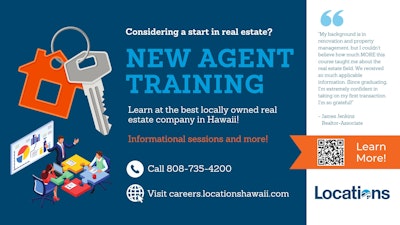
Owning real estate as an investment is all about making money. Therefore, you want to get into a number crunching mindset from beginning to end.
An investment property offers two opportunities for direct financial gain: rent collected that can provide ongoing income, and appreciation that can result in a sizable profit when the property is sold. Choose the right property, and your investment can yield both income and appreciation over the long term.
The main advantage of owning real estate as an investment over other investments, such as stocks, is leverage. You can own an investment property with a relatively small amount of out-of-pocket money. For example, if you wanted to buy $200,000 of stock, you would need $200,000. If you want to own $200,000 of investment real estate, all you would need is 20 percent down, or $40,000. That’s leverage. (There may be circumstances when you can own a property with even less than 20 percent down. Ask your Locations agent.)
Evaluating investment potential is all about the numbers
Basically, the goal is to estimate the monthly mortgage payments, maintenance fees, taxes and insurance and determine if those expenses can all be covered with that income the unit or home provides in rent. If there is money left over, after all the expenses are paid, that is a "positive" cash flow. If there isn’t enough money from the rent to pay all the expenses, that is a "negative" cash flow.
To get a realistic idea of potential rental income for a neighborhood or condominium, check the For Rent section of the newspaper and talk to your Locations agent.
Consider if the property needs to be repaired or renovated, how much the monthly maintenance fee is (if there is one), and how much utilities, taxes and upkeep will deduct from the bottom line. Ask your Locations agent to assist you with this.
Remember, the same tried and true strategies that got you through the process when you purchased your primary residence, apply when you’re considering an investment property. Know how much you can afford to spend. And get pre-qualified first.
Mistakes to Avoid as a First-Time Investor
While there are a lot of people who would like to invest in real estate, many of them simply don’t know where to start. Having a plan involves coming up with specific criteria for a good investment first, then looking for that property - instead of looking at random properties and hoping that one of them will end up making a good investment.
Successful first-timers realize there is a mindset that seasoned investors adhere to — one that is strictly business. Here are some of the common mistakes to avoid:
Mistake #1
The most common mistake made by beginners is getting emotional. Typically, they’ll look for a property they would want to live in. Or they look for "wow" factors instead of return. It really needs to be all about the numbers. When you compare property by its square footage, the dollar-for-dollar best deal might be a one-bedroom condo in Waikiki. The property that provides the highest rent for the lowest price, and with the lowest maintenance fee equals the highest return on your investment. Also keep in mind that in Hawaii, appreciation plays a big role in your investment.
Mistake #2:
Not treating property investing as a business. Remember to leave emotion at the door and view your property as an investment.
Mistake #3:
Investors just starting out tend to sweat the small stuff. Don’t. You are going to encounter unexpected expenses, such as vacancies and air conditioners that break. But in time, your assets will grow. Let it. Be patient.
Mistake #4:
Inexperienced investors tend to under insure. Insure your assets. Liability and flood insurance (if needed) are tax deductible — and necessary.
Cash Flow
You may have no trouble saving for a rainy day, figuring out who the best CPA is, and even know how to allocate funds in your 401k; but when it comes to selecting a good investment property, you may not have a clue.
Experts agree that a good investment is all about picking the right property. Cash flow, tax ramifications and vacancy rates are among the factors that must be evaluated if that one-bedroom has any hope of becoming part of a multi-million-dollar real estate portfolio.
Since the purpose of an investment property is to put money in your pocket, first on the list of criteria is cash flow. While much has been written on the subject, it is not likely you’ll establish much of a positive cash flow right from the start, though it’s not impossible. More realistically, it may take several years before rental income exceeds expenses. However, during the same time period, the value of your property is increasing, and you’re enjoying all of those tax advantages. Still big wins.
Finding the “Perfect” Investment Property for You
Try starting here: Check out our list of Legal Short Term Vacation Rental Properties on Oahu for sale.
One of the fundamental elements to look for in an investment property — that can affect cash flow positively is upside potential – appreciation over time.
Appreciation is the amount of upward price movement. Finding a property that, for example needs cosmetic work like paint or new carpet, can be a pivotal factor in increasing the rate of return via appreciation.
Other physical characteristics to consider — and to inspect — before you buy are the condition of the electrical, plumbing and if it’s single family home, the roof. These items can be costly to repair. The good news is that part of the Purchase Contract in Hawaii is the Property Inspection. It is critical to have maintenance items checked thoroughly by a property inspector and you will know their condition up-front.
On the flip side, a newly constructed or recently renovated property will likely have few major repair items, and will have an extended period of lower maintenance costs. Your Locations agent is specially equipped to help you sort through these investment options.
Bottom line: You need to be realistic about what the income and the expenses will be. Crunch all the numbers. In addition to knowing the condition of the property, you must also know the costs: maintenance fees, real property taxes, gross excise tax, property management fees, insurance, legal fees and mortgage costs, just to name a few.
Do Your Homework
Get professionals to help you and make sure your calculations are correct — that the amount you think you can rent it out for is realistic. Also, make sure you can make the payments even without a renter in an emergency. In other words, you can afford the property.
A general rule of thumb: think long term. Even though speculators can be in and out of properties fast, unless you are a contractor or a tradesman with construction skills, you are not likely to make a quick buck by flipping properties. By thinking long term, you will ultimately put cash into your pocket by reaping both a positive cash flow and increased value through appreciation.
Knowing the numbers is your job as the “president” of your investment real estate business. And you don’t have to run the entire business yourself. Your Locations agent can help you find the best investment property, an accountant will help you with the taxes, and your property manager can help you manage the day-to-day business. Make it easier; hire professionals to work for you. And it all starts with your Locations agent!










